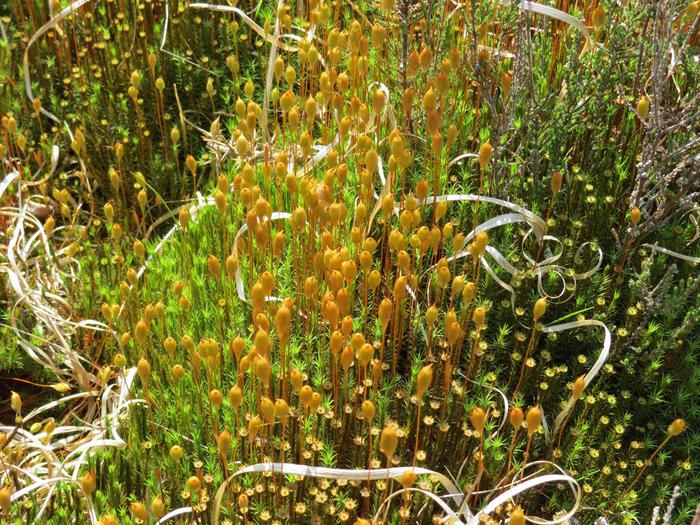A new study has uncovered intriguing insights into the evolution of plant biology, effectively rewriting the history of how they evolved over the past billion years.

Credit: Silvia Pressel, The Natural History Museum
A new study has uncovered intriguing insights into the evolution of plant biology, effectively rewriting the history of how they evolved over the past billion years.
The research, published today in Nature Plants, shows plants have gradually developed their range of anatomical designs throughout the passage of time, punctuated by episodic bursts of innovation to overcome and adapt to environmental challenges.
Such findings overturn the long-held belief that, much like animals, the fundamental range of plant types evolved in a big burst of sudden change early in their evolutionary history.
Co-lead author Philip Donoghue, Professor of Palaeobiology at the University of Bristol, said: “Although plants are extraordinarily diverse in their design and organisation, they share a common ancestor which originated at sea more than a billion years ago.
“We wanted to test whether they really evolved with a big bang early on in their history or whether their evolution was a slower and more continual process. Surprisingly, the results revealed plant evolution was a bit of a mix, with long periods of gradual change interrupted by short bursts of large-scale innovation, overcoming the challenges of living on dry land.”
To test this theory the team of scientists analysed the similarities and differences of 248 groups of plants, ranging from single-celled pond scum and seaweed to land plants including everything from mosses and ferns, to pines, conifers and flowering plants. They also looked at 160 extinct groups known only from the fossil record, including species from the Devonian Rhynie Chert which lived more than 400 million years ago.
More than a 130,000 observations were generated by breaking down plant designs into their components and recording those present or absent in each of the main groups, living and fossil. Computerised statistical techniques measured the overall similarities and differences between groups and how they have varied over time.
The scientists also tried to work out what led to these evolutionary innovations, like the introduction of spores, seeds, roots, leaves, pollen and flowers.
Co-lead author Dr James Clark, Research Associate in Biological Sciences at the University of Bristol, said: “We found changes in plant anatomical design occur in association with events in which the entire cellular genetic make-up was doubled. This has happened many times in plant evolutionary history, as a result of errors in the genome-copying process, creating duplicate copies of genes that are free to mutate and evolve new functions.”
But the major pulses of plant anatomical evolution were found to be associated with the challenge of living and reproducing in increasingly dry environments, connected to the progressive emergence of plants from sea on to land.
Co-lead author Dr Sandy Hetherington’s fascination with the evolution of land plants began as a budding geologist at the University of Bristol and now continues in his work at the University of Edinburgh.
He said: “Overall the pattern of episodic pulses in the evolution of plant anatomical designs matches that seen in other multi-cellular kingdoms of complex life, like animals and fungi. This suggests it is a general pattern and blueprint for complex multicellular life from its inception.”
Paper
‘Evolution of phenotypic disparity in the plant kingdom’ by James W. Clark et al in Nature Plants
Notes to editors
Professor Philip Donoghue, Dr James Clark and Dr Sandy Hetherington are available for interview and advance copies of the embargoed paper can be requested. Please contact Victoria Tagg, Media & PR Manager (Research) at the University of Bristol: [email protected]
Images
https://fluff.bris.ac.uk/fluff/u2/oc20541/_mcB3ejZQJjOMTnnuN0oqgELk/
Caption: The moss, Polytrichum commune, which is one of the closest living relatives of the ancestral land plant.
Credit: Silvia Pressel, The Natural History Museum
https://fluff.bris.ac.uk/fluff/u3/oc20541/y_2cDGSW92fm1yF6LDdirgELg/
Caption: The evolution of plant anatomical variety. Each dot represents a living or fossil species and the connecting lines reflect their evolutionary relationships, branching from a universal ancestor (bottom left) to the most recently evolved group, the flowering plants (bottom right).
Credit: James Clark and colleagues, University of Bristol, UK
https://fluff.bris.ac.uk/fluff/u3/oc20541/QllcweUjKzmlC4sFggkdVwELV/
Caption: A diverse community of land plants, ranging from mosses to flowering species, grow together in boggy stream in the Cairngorms National Park, Scotland.
Credit: Sandy Hetherington, The University of Edinburgh, UK
Journal
Nature Plants
Article Title
‘Evolution of phenotypic disparity in the plant kingdom’
Article Publication Date
4-Sep-2023




